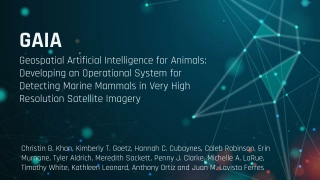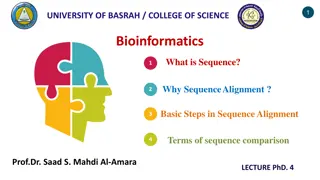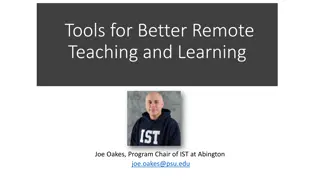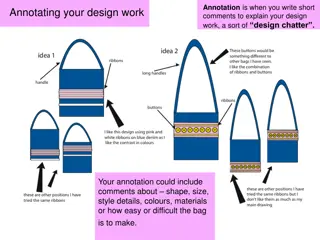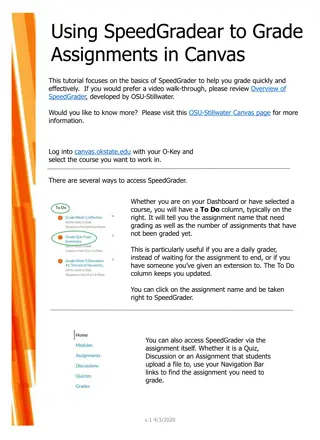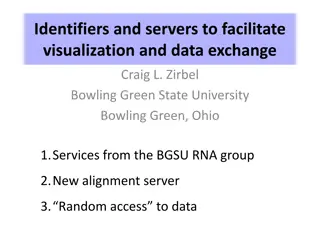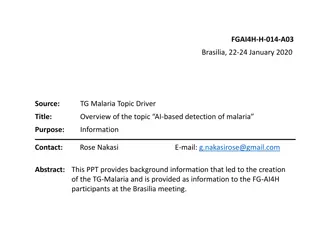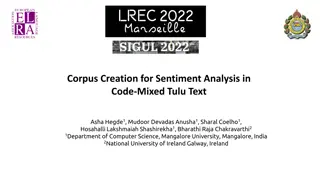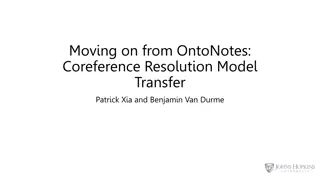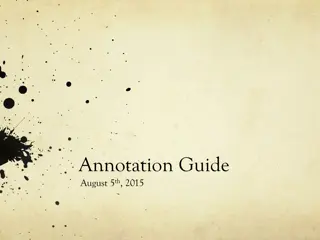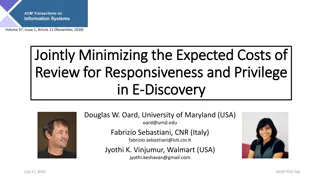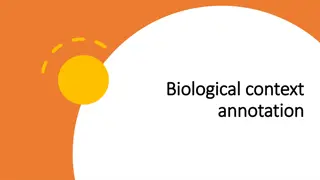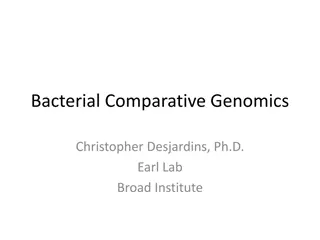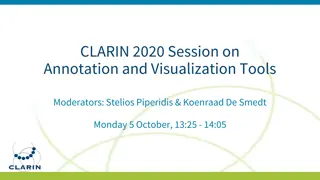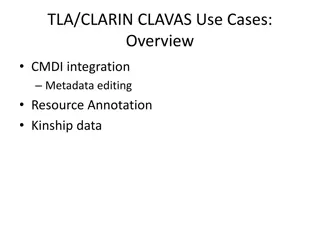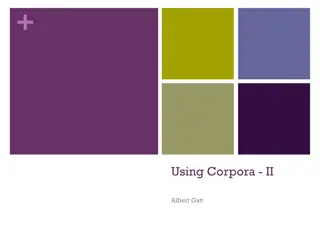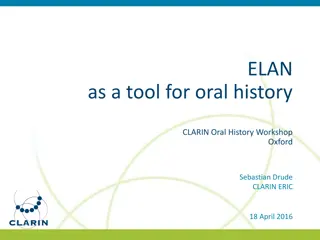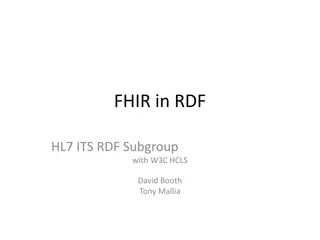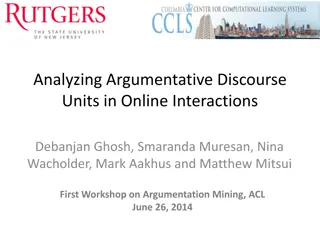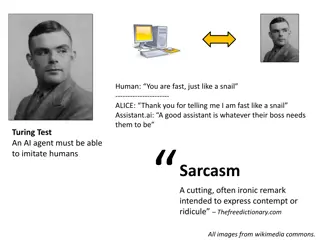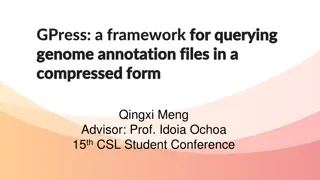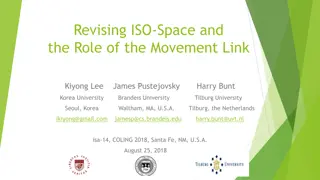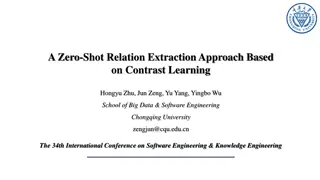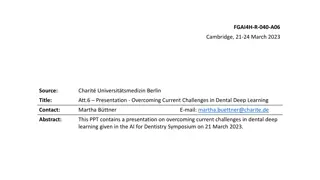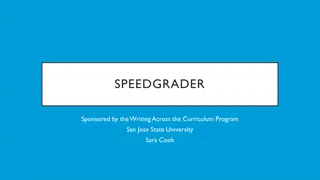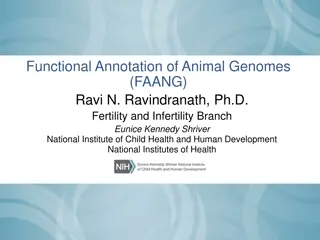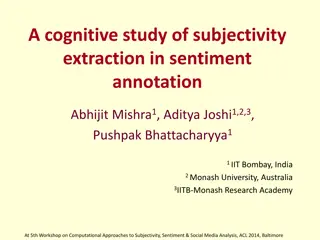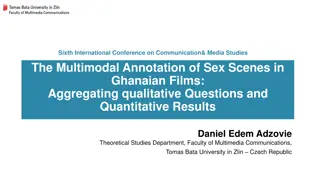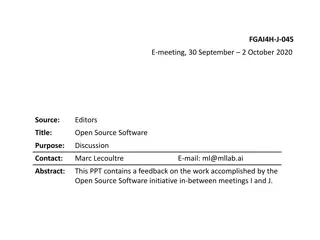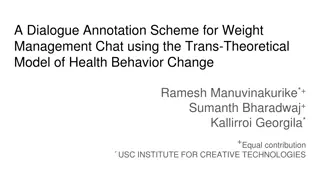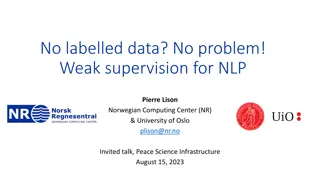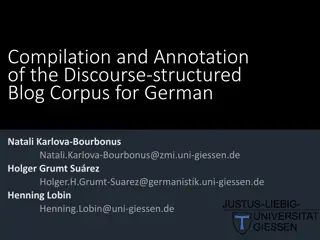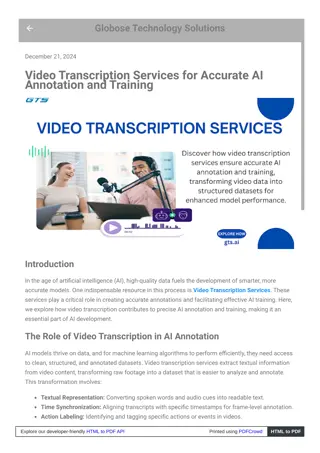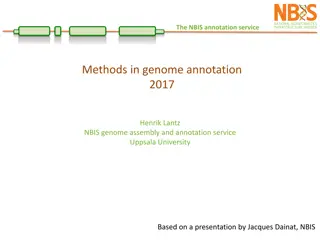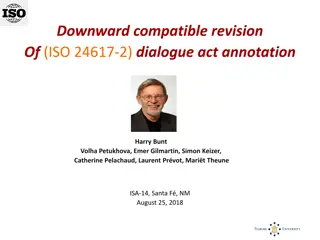Transforming Scientific Data Standardization with Large Language Models (LLMs)
Large Language Models (LLMs) to standardize scientific data, including data format standardization, automatic extraction of metadata, data annotation, data quality assessment, data cleaning, and documentation.
2 views • 5 slides
Revolutionizing Marine Mammal Detection using Geospatial Artificial Intelligence
Delve into the groundbreaking development of an operational system utilizing geospatial artificial intelligence to detect marine mammals in very high-resolution satellite imagery. Explore the global interest, monitoring platforms, proof of concept, limitations, future possibilities, and innovative a
1 views • 20 slides
Integrating UDL and Social Annotation Through Hypothesis Workshop
Learn how to incorporate Universal Design for Learning (UDL) principles with social annotation using Hypothesis Workshop. Discover the benefits of social annotation, ways to align it with UDL, practical assignment examples, and engage in interactive sessions. Join the workshop to enhance student eng
0 views • 38 slides
Bioinformatics
Bioinformatics involves analyzing biological sequences through sequence alignment to uncover functional, structural, and evolutionary insights. This process helps in tasks like annotation of sequences, modeling protein structures, and analyzing gene expression experiments. Basic steps include compar
0 views • 6 slides
Tools for Better Remote Teaching and Learning with ZoomIt
Enhance your remote teaching with ZoomIt, a Microsoft-based screen zoom and annotation tool. Easily zoom in/out, annotate, markup, draw on screen, and capture notes in real-time. Access various options, set hotkeys, adjust zoom magnification, and utilize drawing modes efficiently to engage students
0 views • 5 slides
Annotating Your Design Work: Importance and Techniques
Understanding the significance of annotation in design work, this content emphasizes the value of providing short comments to explain design decisions. Learn how annotating your designs can enhance clarity, communication, and overall appreciation of your creative ideas.
0 views • 4 slides
Efficiently Grade Assignments with SpeedGrader in Canvas
Learn how to use SpeedGrader in Canvas to grade assignments quickly and effectively. Access SpeedGrader from your Dashboard or directly from assignments. Easily provide feedback, assign grades, and utilize annotation tools for detailed feedback.
0 views • 4 slides
Mastering the Literature Review Process
Understanding the significance of literature review, this guide emphasizes the essential steps involved in conducting a successful literature review - from planning and research problem identification to critical analysis and contribution to existing literature. It explains the importance of develop
0 views • 16 slides
Identifiers and Servers for Data Visualization and Exchange
Craig L. Zirbel at Bowling Green State University offers services through the BGSU RNA group for analyzing and annotating RNA 3D structures. They focus on Watson-Crick and non-Watson-Crick base pairs, base stacking, interactions, and motif searches. The group's ultimate goal is to predict 3D motifs
0 views • 31 slides
Engaging Literature Analysis Activities for Effective Learning
Explore activities like daily edits, memoir writing, annotation, vocabulary exploration, and identifying author's purpose and tone to enhance literary understanding. Encourage critical thinking and text analysis through engaging tasks.
0 views • 20 slides
AI-based Detection of Malaria: Overview and Challenges
This presentation delves into the utilization of AI for malaria detection, showcasing the background that led to the creation of TG-Malaria. Highlighting the current burden of malaria in Uganda and other developing nations, it addresses challenges in microscopy diagnosis due to a lack of trained tec
0 views • 20 slides
Corpus Creation for Sentiment Analysis in Code-Mixed Tulu Text
Sentiment Analysis using code-mixed data from social media platforms like YouTube is crucial for understanding user emotions. However, the lack of annotated code-mixed data for low-resource languages such as Tulu poses challenges. To address this gap, a trilingual code-mixed Tulu corpus with 7,171 Y
1 views • 10 slides
Advancing Coreference Resolution: Transfer Model by Patrick Xia and Benjamin Van Durme
Coreference resolution models are crucial for identifying spans of text referring to the same entity. Explore the advancements in coreference resolution, including dataset differences, annotation types, and domain variations through the work of Patrick Xia and Benjamin Van Durme. Dive into the compl
0 views • 23 slides
Comparison of Note-Taking Tools for Students
Explore various note-taking tools such as those for Mac, PC, iPad/iPhone, and more with their advantages and disadvantages as shared by students from different classes. Learn about features like stylus support, annotation capabilities, organization options, and device compatibility to make an inform
0 views • 15 slides
Optimizing Cost Reduction Strategies in E-Discovery
Explore strategies for minimizing the expected costs of document review in E-Discovery processes, focusing on the joint considerations of responsiveness and privilege. Various ideas are presented, including population annotation, automated classification, multi-stage manual reviews, and task-based m
0 views • 12 slides
Enhancing Biological Context Annotation for AOPs: A Comprehensive Approach
Manual creation and homogenization of biological context annotations for AOPs and key events help in interlinking different AOPs to understand possible connections between pathways. The process involves compiling AOPs for various organisms, including humans and model species, annotating key events w
0 views • 13 slides
Bacterial Comparative Genomics: A Comprehensive Overview
Delve into the realm of bacterial comparative genomics with insights on terminologies, assembly methods, annotation processes, and two key approaches to microbial genomics. Explore the basics of genomics terminology, assembly-based and variant-based analyses, as well as annotation methods for protei
0 views • 41 slides
Innovative Tools and Approaches in Language Annotation and Visualization at CLARIN 2020
Presentations at CLARIN 2020 Session focused on annotation and visualization tools, including a neural syntax annotator for Dutch and German, exploring and visualizing Wordnet data with GermaNet Rover, named entity recognition for distant reading in ELTeC, and the semi-automatic analysis of spontane
0 views • 10 slides
Integrating CMDI for Metadata Editing and Kinship Data Annotation
Explore the integration of CMDI for metadata editing in resources, including open/closed vocabularies, Arbil interface for vocabulary management, ELAN for resource annotation, and KinOath for kinship data. Discover how CMDI improves data annotation and vocabularies management in linguistic research.
0 views • 10 slides
Practical Tools for Corpus Search Using Regular Expressions and Query Languages
These notes explore practical tools for corpus search including regular expressions and the corpus query language (CQL/CQP). They provide an introduction to using corpora effectively for pattern identification, with examples and explanations. The guide includes information on levels of annotation an
0 views • 47 slides
ELAN as a Tool for Oral History Workshop Summary
ELAN, a tool developed over 15 years at the Max-Planck-Institute for Psycholinguistics, is utilized in various research contexts like language documentation, acquisition studies, gesture studies, and sign language studies. The workshop covers the introduction to ELAN, basic and advanced features, an
0 views • 14 slides
FHIR in RDF: Requirements for Ontology Mapping and Semantic Representation
Define lossless bi-directional transformations, complete FHIR coverage, enforce constraints, enable inference, and ensure RDF quality in representing FHIR resource instances. Support vocabulary bindings, annotation information, and datatype IRIs while ensuring auto-generatability of mappings.
0 views • 5 slides
Analyzing Argumentative Discourse Units in Online Interactions Workshop
This workshop delves into the analysis of argumentative discourse units in online interactions, emphasizing the segmentation, classification, and relation identification processes. It discusses challenges in annotation and proposes a two-tiered annotation scheme involving expert annotators and novic
0 views • 59 slides
Computational Sarcasm: Understanding, Generating, and Detecting Sarcasm in AI Agents
The emerging theme of Computational Sarcasm explores the nuances of understanding, generating, and detecting sarcasm in AI agents. This involves using incongruity within text, sentiment annotation complexity, and emotion engines to develop sarcasm-enabled chatbots. Various approaches such as rule-ba
0 views • 5 slides
GPress: A Framework for Querying Genome Annotation Files in Compressed Form
Genome projects generate large GFF files which require significant storage space. GPress offers a solution by compressing GFF files while allowing quick searches and random access. The framework addresses challenges faced by current GFF utilities, providing a more efficient approach to managing and
0 views • 24 slides
Revising ISO-Space and the Role of the Movement Link
The study revisits ISO-Space and its role in annotating static and dynamic spatial information in language. It discusses the revision process, fate, entity structures, link structures, and insights derived from ISO-Space. The research emphasizes the importance of formal semantics in spatial annotati
0 views • 26 slides
Zero-Shot Relation Extraction Based on Contrast Learning
This paper presents a zero-shot relation extraction approach based on contrast learning, aiming to improve the efficiency of relation extraction tasks. The methodology involves utilizing a knowledge graph to extract relational triplets and leveraging zero-shot learning to automate the process. The s
0 views • 21 slides
Overcoming Challenges in Dental Deep Learning: Presentation Insights
This presentation by Martha Büttner at the AI for Dentistry Symposium delves into current challenges in dental deep learning, highlighting issues like data sharing, annotation bottlenecks, and comparability gaps. The talk proposes a solution through Federated Learning, showcasing a project on Tooth
0 views • 17 slides
Effective College-Level Reading Strategies for Academic Success
Discover key tips for maintaining a high GPA, achieving academic honors, and excelling in college-level reading. Learn how to stay on top of your reading assignments, become an active reader through effective annotation methods, and develop essential reading habits for academic excellence.
0 views • 12 slides
Enhancing Feedback with SpeedGrader Tools
Explore the SpeedGrader tools provided by the Writing Across the Curriculum Program at San Jose State University. Discover how to customize settings, use annotation tools for in-text feedback, and provide culminating feedback through assignment comments, media comments, and rubrics. Real-world examp
0 views • 73 slides
Importance of Functional Annotation of Animal Genomes in NIH Research
Functional Annotation of Animal Genomes (FAANG) is crucial for associating sequence variation with quantitative phenotypes in domestic animals, serving as important models for human health, disease, and ecology. The NIH actively participates in various genome projects involving cattle, horses, and c
0 views • 10 slides
Cognitive Study of Subjectivity Extraction in Sentiment Annotation
A cognitive study on extracting subjectivity in sentiment annotation, exploring if humans perform subjective extraction similarly to machines for sentiment analysis. The study investigates sentiment oscillations and different methods adopted based on the nature of subjective documents.
0 views • 14 slides
Analyzing Representation of Sex Scenes in Ghanaian Films
Exploring the portrayal of sexual intercourse in Ghanaian films against cultural values, this study introduces a multimodal annotation scheme for analysis. Addressing concerns raised by the public, it delves into the complexities of conveying sex in a culture that tends to discourage open discussion
0 views • 12 slides
Open Source Software Initiative Progress Update
The Open Source Software initiative progress update provides insights into the work accomplished during e-meetings, focusing on the development of a modular annotation tool shared by a focus group. The group's activities, such as drafting requirements, analyzing survey results, and setting up collab
0 views • 9 slides
Dialogue Annotation Scheme for Weight Management Chat
Obesity is a prevalent issue with individuals seeking ways to change their health behaviors. The article explores a dialogue annotation scheme using the Trans-Theoretical Model of Health Behavior Change. It delves into stages like precontemplation, contemplation, preparation, action, and maintenance
0 views • 11 slides
Weak Supervision for NLP: Overcoming Labelled Data Challenges
Addressing the challenge of acquiring labelled data for NLP models, weak supervision techniques offer solutions through alternative annotation methods and leveraging diverse data sources. This talk highlights the importance of overcoming the scarcity of labelled data in machine learning and NLP task
0 views • 18 slides
German Discourse Blog Corpus Compilation & Annotation
Compilation and annotation of a discourse-structured blog corpus for German, involving data collection, annotation, addressing specific problems, and planning next steps. The project focuses on fostering interoperability, meeting requirements, and developing models for annotating blogs' structural a
1 views • 39 slides
blogspot_Video Transcription Services for Accurate AI Annotation and Training
Video transcription services are integral to accurate AI annotation and training. They convert video content into structured, annotated datasets, enhancing model accuracy, scalability, and efficiency. Discover their applications and benefits for AI d
0 views • 4 slides
Methods in Genome Annotation Service 2017: Approaches and Tools
This content delves into the methods and approaches used in genome annotation services, focusing on eukaryotes. It covers different annotation approaches such as similarity-based methods, ab initio prediction, hybrid approaches, comparative gene finders, and more. The lecture discusses popular tools
0 views • 53 slides
Downward Compatible Revision of ISO 24617-2 Dialogue Act Annotation
The downward compatible revision of ISO 24617-2 focuses on characteristics, limitations, compatibility, improvements, and extensions of the dialogue act annotation scheme. It provides a comprehensive taxonomy of dialogue acts, covering various dimensions of communication such as task management, fee
0 views • 32 slides

